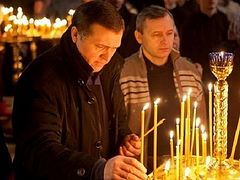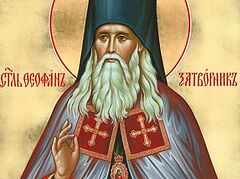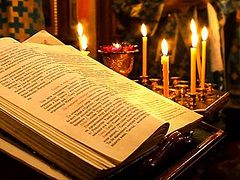“The greatest possible achievement of human beings on the earth”, “the most energetic activity”, “the best transportation to Heaven”, “the most tactful educator of your mind, heart and whole personality”, and “the only entryway into genuine self-knowledge”—this is what strugglers for piety say about prayer. But how can we learn to pray? We have asked for some experienced pastors’ advice.
In order to learn to pray we should start to pray!
Metropolitan Athanasios of Limassol, the Church of Cyprus:
There is a Greek proverb: “Appetite comes with eating.” In order to learn to pray we first must force ourselves to pray. The Lord in the Gospel says, The kingdom of heaven suffereth violence, and the violent take it by force (Mt. 11:12).
In order to learn to pray we should start to pray! Through our efforts prayer will be in action inside us. And in each one of us it will work in a unique way because we are all unique, and prayer is the expression of every individual soul in its communion with God.
What helps us pray? The fulfilment of the commandments. Once we have broken any commandment, we “stumble” in prayer. The Church sacraments, especially confession and Communion, were given us to help us improve. Staying in the spirit of obedience, concentration and silence also has a salutary effect on our prayer.
 Metropolitan Athanasios of Limassol
Metropolitan Athanasios of Limassol
As the elders taught us, new converts should be more concerned with the quantity, and not quality, of prayer. They should just repeat prayers continuously and forget about quality. Later, at some point, prayer will become an inseparable part of your heart, your soul will taste the sweetness of prayer and realize that there is nothing more desirable in the world. This is how the problems we face while learning to pray are solved.
And then prayer begins to work in us. Elder Ephraim of Katounakia used to say: “My prayer directs me, and not vice versa.” And prayer will guide us where the Lord wants us to go.
The Lord helps neophytes in everything
Schema-Archimandrite Iliy (Nozdrin):
The apostles asked the Savior to teach them how to pray. And He gave a very effective and simple prayer to all of us—“Our Father.” In it we glorify, repent, thank and ask at the same time. Although, our Heavenly Father knows all our needs before we offer up our petitions. If the Creator delays in answering our prayers, He does it because He wants us to realize the pettiness of our entreaties. The Lord’s Prayer encompasses everything: nourishment, protection, healing of our souls and our salvation in eternity.
 Schema-Archimandrite Iliy (Nozdrin)
Schema-Archimandrite Iliy (Nozdrin)
Prayer is our treasure in heaven. Therefore, if we pray, our hearts will abide there (cf. Mt. 6:21). And the rest will come in due time. The Gospel proclaims: Seek ye first the Kingdom of God, and His righteousness; and all these things shall be added unto you (Mt. 6:33).
The prayer of every human being is of cosmic importance—that is, it has an effect not only on somebody individually, or his family and immediate circle of friends, but also on the entire world. Likewise, every sin brings the universe closer to its destruction.
If we take care of our bodies, nourishing, clothing and protecting them, then how can we fail to take care of our souls? The life of the soul is sustained by prayer.
You just need to start praying. When a baby is born, he receives all-round care from its parents. Likewise, when a person is born into spiritual life, God helps him in everything in the initial stage.
Demons may help prideful people!
Why is it better to learn to pray with a blessing?
Metropolitan Evgeny of Tallin and All Estonia:
Here is the following story from a paterikon. Once a novice came to a monastery; in the world his prayer had been zealous and bold. Having heard about his “spiritual labors”, the abbot referred him to an experienced spiritual elder. The elder blessed the novice to perform a short prayer rule. Although the brother’s heart was swollen with indignation, he replied: “Let it be blessed!” Some time passed. The brother returned to his elder and said: “Father, I can’t perform this rule. Could you shorten it, please?” During the conversation, while revealing his thoughts, he wondered: “Why is it that I prayed so much before coming to the monastery and now I can’t even manage this short rule?” And the elder explained: “We don’t know who helped you in the world.”
 Metropolitan Evgeny of Tallin and All Estonia
Metropolitan Evgeny of Tallin and All Estonia
Prayer is the most precious thing we have. That’s why those who pray face strong opposition from the evil one. Just imagine the first years after the Russian Revolution. The world was falling apart, empires were collapsing one after another. In the meantime, in the 1920s, Priest Sergei Mansurov [1890—1929; a Russian Church historian.—Trans.] wrote, “The Church’s history is the history of Her saints. Whatever happens, the universe still exists thanks to these heralds of God’s will in our world, and is imbued with the grace they have acquired. And upon this rock I will build My Church; and the gates of hell shall not prevail against it (Mt. 16:18)—here Christ spoke about the saints’ confession of faith, that although they might stumble and even renounce Him, like Peter they repented.”
“Regardless of how much impious rage, murder and desecration there may be, God’s work in this world is manifest through saints. Christ has overcome the world and the devil. All that is founded on untruth will collapse and be burned down, while the Orthodox faithful all over the world read the prayers of such saints as Macarius the Great, John Chrysostom and others every morning and every evening, every minute and every hour; and thus the world continues to exist,” Fr. Sergei Mansurov emphasized.
Learn to be silent, and silence will teach you to pray
Archbishop Theognost of Kashira:
 Archbishop Theognost of Kashira
Archbishop Theognost of Kashira
In order to learn to pray we should learn to be silent. Because when we speak, we don’t feel how God hears our prayer. We must learn to keep our minds and hearts quiet as we pray, and then we will be able to hear the Lord in this inner stillness. Be still, and know (Ps. 45:11)—the Lord says in the Psalter. That is, stop, free yourself, stand still—and hear what I shall tell you. But to this man will I look, even to him that is poor and of a contrite spirit, and trembleth at My word (Is. 66:2)…
Prayer is preceded by stillness, but we ought to keep silent a little after prayer too. Set a watch, O Lord, before my mouth; keep the door of my lips (Ps. 140:3).
May the Lord Himself reveal the mystery of silence to us, for it is only through it that we can hear God and thus learn to pray to Him.
Prayer is universal, it is for everyone
Metropolitan Tikhon of Vladimir and Suzdal:
 Metropolitan Tikhon of Vladimir and Suzdal
Metropolitan Tikhon of Vladimir and Suzdal
In the Old Testament we find these names of God: Jehovah, Adonai, Sabaoth… They indicate a personal relationship with God—we address Him by His name, personally. What name was revealed to us in the New Testament? Lord Jesus Christ. We address Him personally in the Jesus Prayer. Neither is there salvation in any other: for there is none other name under heaven given among men, whereby we must be saved (Acts 4:12). Wherefore God also hath highly exalted Him, and given Him a name which is above every name: That at the name of Jesus every knee should bow, of things in heaven, and things in earth, and things under the earth; And that every tongue should confess that Jesus Christ is Lord, to the glory of God the Father (Phil. 2:9-11). The hesychasts entrusted us with the task of invoking the name of the Lord, for it is in communion with the Lord Jesus Christ that man becomes perfect.
What did the hesychasts say? Everyone begins with prayers written in books. That’s why such books are called prayer-books. They are like the foundation, where the words are “carved” and “engraved” by the Fathers and then laid into these solid and stable constructions. Using this foundation, we understand dogmatics, liturgics, and Church history more fully; after all, in earlier times not everybody could attend Sunday schools or theological courses. These are the rudiments without which we can’t build anything.
After we get accustomed to the rule, we proceed to the second step of prayer—the invocation of the name of our Lord. This is already proper prayer. It is called the Jesus Prayer, after our Savior. According to the Holy Fathers, its first stage is oral prayer (the prayer of the lips) when we simply repeat it aloud: “Lord Jesus Christ, Son of God, have mercy on me, a sinner.” After we have mastered the prayer of the lips, we proceed to the prayer of the mind (of the nous, or intellect), when we pray not only by the tongue but also with the mind. No man can say that Jesus is the Lord, but by the Holy Ghost (1 Cor. 12:3). You can’t perform mental prayer unless you have cleansed your mind. If you don’t have the desire to purify your heart and receive spirit, you’ll get bored with the prayer quickly and abandon it.
That’s why it is important to be guided by a spiritual elder in the life of prayer. Your elder helps you make progress in spiritual life, prays for you and directs you. Of the thousands of people who have succeeded in purifying their souls, only a few attain perfection.
If you pray properly, then you reach the next step when prayer descends from the head to the heart, and the enlightenment of your heart begins. The oral prayer, the mental prayer and the prayer of the heart unite, and the Lord begins to illumine your will. According to the Fathers, with proper spiritual guidance you can draw close to purity within ten years. Purity is also called dispassion (apatheia). If you have developed purity of the mind, feelings, and will, passions will disappear. Without prayer this state is unattainable.
Dispassion is such a sublime state that some presume that it is holiness. But it is not yet holiness. It is purity, and it is attained through Divine grace. Passions disappear; and it is not until then, when you become more or less free from them (sometimes God even allows saints to suffer from one or another passion, as a thorn in the flesh (2 Cor. 12:7), to keep them from becoming conceited), that you can embark on the path of self-perfection. Grace for grace (Jn. 1:16), as the Gospel proclaims; and the Lord testifies: He that believeth on Me, as the scripture hath said, out of his belly shall flow rivers of living water (Jn. 7:38). In each ascetic the gifts of the Holy Spirit are revealed individually—some possess the gift of prophecy, others, healing, yet others, clairvoyance. In this case it is possible to help others. But as long as we are wallowing in passions, our good deeds will be “with a touch of sin”; as a result we are helping neither ourselves nor our neighbors. Our constant struggle to overcome passions is vital. For the good that I would I do not: but the evil which I would not, that I do (Rom. 7:19).
The next step is contemplative prayer. The Gospel says of it: The Kingdom of God is within you (Lk. 17:21). There should be no spite, no despair, no love of money in us, but only Heavenly light. The Lord showed it on Mount Tabor. But how can you acquire it if you have no one to ask for advice? The Fathers taught that the power of truth is in purity of spirit. But that’s a high level.
St. Seraphim of Sarov taught us to practice the virtue that gives us the greatest spiritual profit. He noted that prayer gives us more of God’s grace than the other virtues. Moreover, prayer is universal—it is for everyone. Likewise, some ascetic labors are only for the chosen ones, while some of them can be practiced by anyone. You have only to say, “Lord!”, and Divine grace will come. The Lord has already saved us—we only need to accept this mercy. We just need to realize that our state is disastrous and leads to perdition and that we need the Savior. We keep sinning all the time, therefore we must invoke the name of God unceasingly: “Lord Jesus Christ, Son of God, have mercy on me, a sinner!” Here is the invisible thread! The very word “religion” (from Latin “religare”) means to “tie back”, “bind back”. Whosoever shall call upon the name of the Lord shall be saved (Rom. 10:13). There will be no fuss in the age to come—there will only be prayer there; that is all.
Come to yourself and live as you pray
Metropolitan Andria of Gori and Ateni, the Georgian Orthodox Church:
 Metropolitan Andria of Gori and Ateni
Metropolitan Andria of Gori and Ateni
There should be the feeling and sense that you are standing in the presence of God. You should be conscious that you need forgiveness, that you are sick and need healing. This is the sense we must find in ourselves. When we don’t feel like this, we must suffer and repent all the same. “I am standing before Thee, O Lord, but I don’t have this feeling…” All the more reason to repent: “Forgive me, O Lord, I’m feeling empty today. Help me! I’m aware of this feeling.” This is the most important thing: As the Lord liveth, and as thy soul liveth (4 Kings 2:2). “I know this and am conscious that I need this.” I don’t think that’s too difficult.
Understand what you are reading and feel what you understood
Priest Igor Blinov, Sts. Martha and Mary’s Convent in Moscow:
I especially like the instruction of St. Theophan the Recluse. “First and foremost, you need to prepare for prayer, realizing your unworthiness before the greatness of Him Who you are going to address. If your heart trembles and you feel your smallness, then the Lord will condescend to you and show you much favor.”
“Pray, discerning every word and taking it close to your heart. In other words, you should understand what you are reading and feel what you understood. No other rules are needed,” St. Theophan taught. It is useful to read the Holy Fathers, about how they learned to pray.
How Fr. Nikolai Gurianov answered this question
Schema-Hieromonk Valentin (Gurevich), father-confessor of Donskoy Monastery in Moscow:
 Schema-Hieromonk Valentin (Gurevich)
Schema-Hieromonk Valentin (Gurevich)
Once someone asked Fr. Nikolai Gurianov to teach him how to pray the Jesus Prayer. Fr. Nikolai replied: “Lord Jesus Christ, Son of God, have mercy on me, a sinner. I won’t tell you anything else.”





